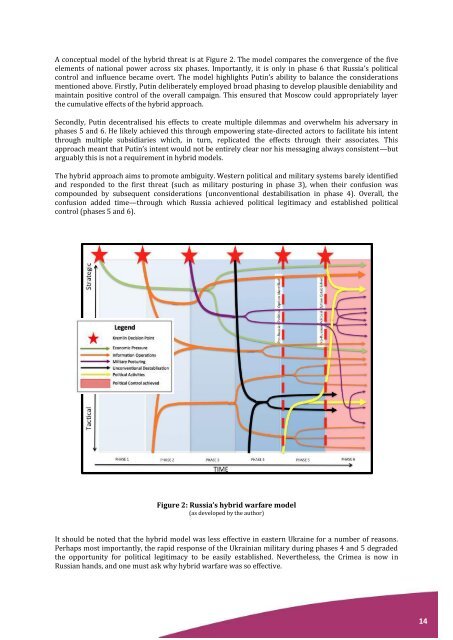Issue No 198 2015
198 2015 Nov_Dec
198 2015 Nov_Dec
Create successful ePaper yourself
Turn your PDF publications into a flip-book with our unique Google optimized e-Paper software.
A conceptual model of the hybrid threat is at Figure 2. The model compares the convergence of the five<br />
elements of national power across six phases. Importantly, it is only in phase 6 that Russia’s political<br />
control and influence became overt. The model highlights Putin’s ability to balance the considerations<br />
mentioned above. Firstly, Putin deliberately employed broad phasing to develop plausible deniability and<br />
maintain positive control of the overall campaign. This ensured that Moscow could appropriately layer<br />
the cumulative effects of the hybrid approach.<br />
Secondly, Putin decentralised his effects to create multiple dilemmas and overwhelm his adversary in<br />
phases 5 and 6. He likely achieved this through empowering state-directed actors to facilitate his intent<br />
through multiple subsidiaries which, in turn, replicated the effects through their associates. This<br />
approach meant that Putin’s intent would not be entirely clear nor his messaging always consistent—but<br />
arguably this is not a requirement in hybrid models.<br />
The hybrid approach aims to promote ambiguity. Western political and military systems barely identified<br />
and responded to the first threat (such as military posturing in phase 3), when their confusion was<br />
compounded by subsequent considerations (unconventional destabilisation in phase 4). Overall, the<br />
confusion added time—through which Russia achieved political legitimacy and established political<br />
control (phases 5 and 6).<br />
Figure 2: Russia’s hybrid warfare model<br />
(as developed by the author)<br />
It should be noted that the hybrid model was less effective in eastern Ukraine for a number of reasons.<br />
Perhaps most importantly, the rapid response of the Ukrainian military during phases 4 and 5 degraded<br />
the opportunity for political legitimacy to be easily established. Nevertheless, the Crimea is now in<br />
Russian hands, and one must ask why hybrid warfare was so effective.<br />
14


